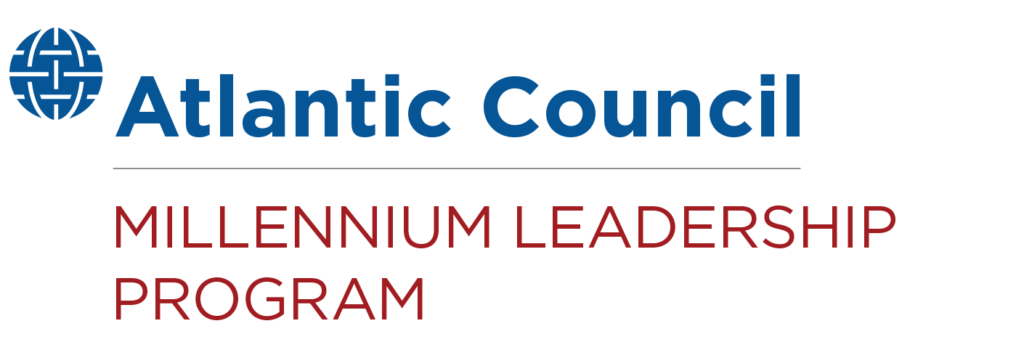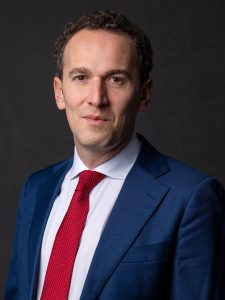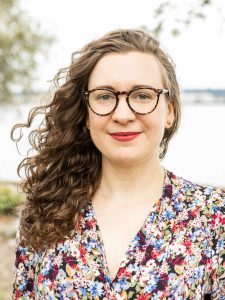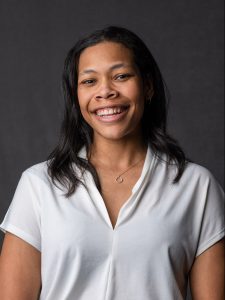Overview
Millennium Fellows join a global network of exceptional peers, receive unparalleled opportunities to meet with world leaders, go behind the headlines to explore global challenges up-close, and lead the debate on issues that will shape the century. They complete a comprehensive, year-long leadership curriculum, receive individualized executive coaching, and have access to a range of Atlantic Council events. Through these shared travel and learning experiences, fellows forge relationships that last a lifetime.
“The MLP is, in my mind, the most impactful leadership program in the world for international policymakers, business leaders, and public intellectuals.“
Dr. Manuel Muniz
Secretary of State for Global Spain, Ministry of Foreign Affairs of Spain
MFEL Class of 2016
Program Structure
The Millennium Fellowship is a part-time program that consists of engaging virtual content and an in-person Study Tour. To frame their experience, fellows start by completing a leadership diagnostic assessment developed by our partners at leadership consulting firm, Spencer Stuart. This Individual Style Profile helps Fellows to better understand their leadership strengths and blind spots as well as develop strategies for charting a personal pathway for growth. Over the course of the program, fellows complete a comprehensive leadership development curriculum. Through interactive workshops, case work, and peer consulting, fellows hone their sense of purpose and enhance their capacity to mobilize change.
Other key components of the Millennium Fellowship programming include monthly master classes with distinguished senior leaders and subject matter experts, individualized executive coaching, and intentional networking.
The program’s virtual offerings are accompanied by an in-person Study Tour wherein fellows travel to the frontlines of a global challenge. Tours grant Fellows a deep dive into a local issue as a way to explore wider contemporaneous macro-trends. Recent tours include a post-conflict South Caucasus trip through Azerbaijan, Georgia and Armenia; Turkey and Greece at the height of the Syrian Refugee crisis; Colombia after the FARC peace deal; and Ukraine after the Revolution of Dignity. You can read more about Study Tours below.
Finally, fellows have access to a menu of Atlantic Council events such as panel discussions, virtual conferences, in-person summits, and more.

January – March 1, 2024
Application window
April – May 2024, 2024
Millennium Leadership programming
September – June 2025
Fellow interviews and selection
June 2025
Introduction to alumni community
Study Tours
Study Tours allow fellows to travel to the frontlines of a global challenge. During the course of a week and a half, Fellows take a deep dive into a local issue as a way to explore wider contemporaneous macro-trends.

South Caucasus Tour (October 2021—due to the ongoing COVID-19 pandemic, the Study Tour for 2020 fellows was held in 2021).
Fellows traveled to Azerbaijan, Georgia, and Armenia for a close-up exploration of leadership in action on the issues of conflict, great power competition, democratic backsliding, climate change, and economic shifts. The group met with five current or former heads of state and government (including Prime Minister Irakli Garibashvili of Georgia and Armenian President Armen Sarkissian), four cabinet ministers, five senior advisors to heads of state, four members of Parliament, a US ambassador, and numerous civil society, business, and think tank leaders. Through these meetings, fellows developed a holistic understanding of the challenges facing the Caucasus and thought about how to integrate these insights into their respective work environments.
Colombia Study Tour (July 2019)
Exploring the tension between peace and justice shortly after the historic FARC peace deal, fellows visited the cities and jungles of Colombia with stops in Bogotá, Medellín, San Carlos, and Guatapé. They met with twelve elected officials and cabinet members that included both current Colombian President Ivan Duque and former President Álvaro Uribe. Additionally, fellows met with former National Liberation Army (ELN), paramilitary, and guerilla fighters to understand their perspectives. Fellows also explored the Venezuelan refugee crisis that was rapidly unfolding concurrently with their tour, meeting with dissident leaders in exile in Bogotá. This trip included an immersive leadership retreat with United Nations and US peace negotiators who participated in the historic deal as well as participation in the Concordia America’s Summit that coincided with the stop in Bogotá.
Aegean Study Tour (July 2018)
Fellows traveled to Turkey and Greece, the front lines of the world’s largest humanitarian crisis since the end of World War II, to explore the migrant crisis and its layered implications for international cooperation and security. Specifically, the tour examined the complex dynamics linking the situation on the ground to the international community’s response and offered a window into the perspectives of government officials, business leaders, nongovernmental organizations, and the refugees themselves. Fellows participated in a range of site visits and meetings with key stakeholders, traveling to camps in both Turkey and Greece and joining the Turkish coast guard for a demonstration of Aegean Sea rescue operations.
West Virginia Study Tour (June 2017)
Fellows traveled to Pittsburgh, Pennsylvania, and Morgantown, West Virginia, to explore the relationship between the energy sector, climate policy, and the 2016 US election. Fellows met with energy and sustainable development experts, business leaders, academics, and individuals impacted by the changing energy landscape and national environmental policy. Through these conversations, fellows gained insight into the relationship between the energy sector and voting patterns, partisanship in industrial communities, and the role of traditional energy sources in the age of renewables.
Sarajevo Study Tour (July 2016)
Twenty-five years after conflict broke out in the former Yugoslavia, fellows traveled to Sarajevo, Bosnia and Herzegovina to explore lessons from the conflict and learn about the current security, economic, and political situations in Bosnia and the Western Balkans. On the eve of the NATO Summit, Fellows examined the case study of Operation Deliberate Force, NATO’s first combat operation launched after the Srebrenica massacre. Though meetings with members of Parliament, artists and journalists who covered the war, senior international officials, historians, activists, and local entrepreneurs, fellows learned about the war’s causes, the role of the international community in the conflict and peace process, and the challenges to “winning the peace” after fighting ended.
Kyiv Study Tour (November 2015)
Fellows traveled to Kyiv, Ukraine for the two-year anniversary of the Euromaidan protests. They met with civil society activists who launched the Revolution of Dignity and lead calls for transformational change, defense officials confronting Russia’s war in Ukraine’s east, young entrepreneurs seeking to fuel Ukraine’s economy, and top government executives overseeing unprecedented reforms. These government officials included then Finance Minister Natalie Jaresko, Trade and Development Minister Aivaras Abromavičius, and Member of Parliament and Head of the Committee on Foreign Affairs Hanna Hopko.
FAQs
Q: How do I apply for the Millennium Fellowship?
A: Applications for the next cohort are now closed. Please check back in early winter for information on the 2025 application. In the application, you will be asked for your demographic information, employment details, responses to a few short essay questions, resume, bio, and a current headshot. You can also request to be considered for a scholarship.
Q: Are citizens of all countries eligible to apply for the Millennium Fellowship?
A: Yes. The Millennium Fellowship is open to next-generation leaders from all countries.
Q: Am I too old for the Millennium Fellowship?
A: The Millennium Fellowship is open to anyone who is twenty-five to thirty-nine years old as of the deadline for the corresponding application cycle.
Q: I am still a student. Am I eligible to apply for the Millennium Fellowship?
A: The Millennium Fellowship is open to anyone who is twenty-five to thirty-nine years old as of the deadline for the corresponding application cycle, including students.
Q: Are government employees eligible to participate in the Millennium Fellowship?
A: Yes, government employees are eligible. They are responsible for complying with any stipulations for participation as required by their employers.
Q: What is the application timeline?
A: Our application is open January through March 1st. For more details about the program timeline, please review our calendar.
Q: What is the time commitment for the Millennium Fellowship?
Fellows commit to approximately 8-10 hours per month of virtual convenings and distance learning over a twelve-month span, as well as 10 days of Study Tour travel.
Q: How long is the Millennium Fellowship?
A: The Millennium Fellowship is a year-long opportunity. Upon program completion, Fellows join the Millennium Fellowship alumni network and have access to opportunities for continued engagement with the Millennium Leadership Program and Atlantic Council.
Q: How much does the Millennium Fellowship cost, and what is included?
A: Fellows employed by the nonprofit, academic and/or public sector pay a program fee of $2,000. Fellows employed by the private sector pay a program fee of $12,500. Fees cover all virtual programming costs and on-the-ground expenses (accommodations, group meals, etc.) associated with the Study Tour. Program fees do not cover international and domestic airfare, visas, or any incidentals incurred while traveling for the Study Tour.
Q: Will the Atlantic Council cover visa expenses for travel with the Millennium Fellowship?
A: No. Fellows are responsible for obtaining their own travel visas and paying all associated costs. The Atlantic Council can assist in the visa application process by providing documentation confirming participation in the Millennium Fellowship but will not cover expenses associated with this process.
Q: I can’t afford the program fees. How do I apply for a scholarship?
A: Our application includes an opportunity for you to request a program scholarship and explain the reason for your request. If selected as a fellow, you will complete additional paperwork to waive the financial commitments of the program prior to signing your official offer letter.
Q: Is the Millennium Fellowship a full-time job or paid position?
A: No. The Millennium Fellowship is a part-time professional development and networking opportunity rather than a paid position. Fellows maintain their position with their employer and do not receive payments from the Millennium Leadership Program.
Q: Does the Millennium Fellowship provide living expenses?
A: No, the Millennium Fellowship is not a full-time position and does not require an extended stay in any one location. As such, the Fellowship does not provide living expenses.
Q: What is the average cost of the program per fellow?
A: The real cost of participation in the Millennium Fellowship is approximately $30,000 per fellow. Fellows pay program fees at a fraction of this cost ($2,000 for those employed by the nonprofit, academic and/or public sector and $12,500 for those employed by the private sector).
Q: Who funds the Millennium Fellowship?
A: The program draws its support from grants, individual donors, corporate sponsors, Atlantic Council funds, and program fees.
Q: Who should I or my employer reach out to with further questions?
A: The Millennium Leadership Program team is happy to answer any questions which you can direct to Millennium@AtlanticCouncil.org.


The Millennium Leadership Program aims to foster, connect, and empower the next generation of global leaders.



Follow us on social media